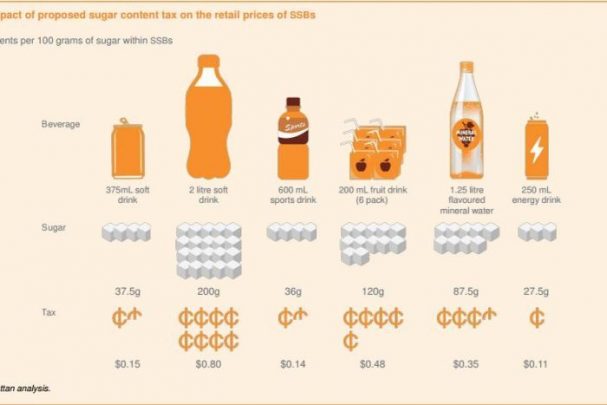Here’s what the sugar tax would do to prices

The soft drink industry was worth more than $3 billion a year in revenue but obesity costs taxpayers $5.3 billion annually. The Grattan Institute has now recommended a sugar sweetened beverage tax to fight obesity which have increased in recent decades. A recently released economic modelling shows that a tax on sugar could not only reduce soft drink consumption by 15 per cent but also raise $500 million for the budget. According to the Grattan Institute, one in three Australians now classed as obese and the disease actually costs taxpayers $5.3 billion annually.
But what happens when a tax is imposed on sugar? What does this mean to consumers? Based on a proposal by the Institute, a tax of 40 cents per 100 grams of sugar would lift the price of a two-litre bottle of soft drink by about 80 cents. It means that consumers who have soft drinks as part of a regular diet will spend a lot more.
According to Dr Stephen Duckett, director of the Institute’s health program, the $500 million is raised by targeting only those who consumed soft drinks. “That is the total spending of a household on all beverages — not only sugar sweetened — is less than .75 per cent of their household income, and for wealthier households it’s .45 per cent. “So there is a regressive effect, but it’s such a small proportion of household income that it’s not really significant,” said Dr Duckett.
Dr Duckett said soft drinks were not solely responsible for the obesity problem, but they should be targeted because they have no nutritional value and children are big consumers.
“What we’re trying to do is recognise that this is not the solution to obesity in this country, rather part of the solution,” he said.
“We’ve tried all sorts of other programs, there’s been dozens of inquiries, there’s been dozens of programs and still obesity, the prevalence of obesity is going up both for adults and more importantly for children.”
But the proposal has not gone without resistance. The food industry, sugar cane growers, sugar millers and farmers have opposed proposals for sugar taxes, saying there was no evidence they improve health.
But Dr Duckett said taxing soft drinks had shown to help cut rising obesity.
“There’s been a number of studies of overseas countries where they’ve introduced taxes of this kind — Mexico, the city of Berkley in California and so on,” he said as quoted on ABC News.
“And what it shows is there is a shift away from sugar sweetened beverages towards tap water or mineral water or other beverages, and that reduces sugar intake.

“They’ve found that and have predicted a marginal reduction in obesity and in a sense a plateauing of the escalation prevalence in the country.”
Impact of tax on industry ‘would be minimal’
The Grattan Institute report said industry data showed the soft drink industry was worth more than $3 billion a year in revenue and Dr Duckett believes the industry has overestimated the impact of a sugar tax.
“If you look at the Australian sugar industry, 80 per cent of Australian sugar is exported and when you look at the remainder, there’s a lot of sugar used in other sorts of food and drinks,” he said.
“So the impact of our change is going to be very small on the sugar industry.
“In terms of the impact on the beverage industry, I don’t know the relative profitability of say Coca-Cola versus Mount Franklin mineral water, but the same company owns both brands.
“So there might be a shift from Coke to Mount Franklin that may change the profitability — it may improve the profitability.”








 Proudly Australian owned and operated
Proudly Australian owned and operated